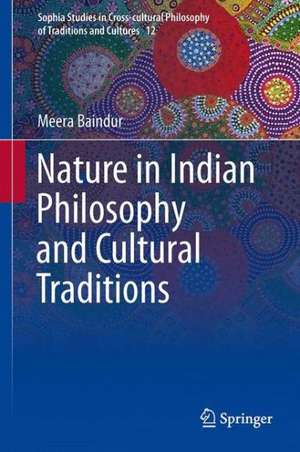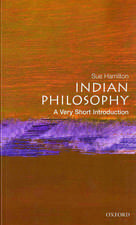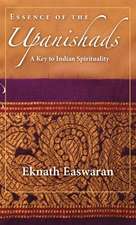Nature in Indian Philosophy and Cultural Traditions: Sophia Studies in Cross-cultural Philosophy of Traditions and Cultures, cartea 12
Autor Meera Bainduren Limba Engleză Hardback – 2 iun 2015
It begins with a brief description of the concept of nature and a history of the idea of nature in Western thought. This provides readers with a context to the issues around the concept of nature in environmental philosophy, setting a foundation for further discussion about alternate conceptualizations of nature and their significance. In particular, the work covers a wide array of textual and non-textual sources to link and understand nature from classical Indian philosophical perspectives as well as popular understandings in Indian literary texts and cultural practices. Popular issues in environmental philosophy are discussed in detail, such as: What is ‘nature’ in Indian philosophy? How do people perceive nature through landscape and mythological and cultural narratives? In what ways is nature sacred in India?
To make the discussion relevant to contemporary readers, the book includes a section on the ecological and ethical implications of some philosophical concepts and critical perspectives on alternate conceptualizations of nature.
| Toate formatele și edițiile | Preț | Express |
|---|---|---|
| Paperback (1) | 362.82 lei 39-44 zile | |
| Springer India – 23 oct 2016 | 362.82 lei 39-44 zile | |
| Hardback (1) | 376.15 lei 39-44 zile | |
| Springer India – 2 iun 2015 | 376.15 lei 39-44 zile |
Din seria Sophia Studies in Cross-cultural Philosophy of Traditions and Cultures
-
 Preț: 395.25 lei
Preț: 395.25 lei - 18%
 Preț: 726.69 lei
Preț: 726.69 lei - 15%
 Preț: 701.72 lei
Preț: 701.72 lei - 15%
 Preț: 651.67 lei
Preț: 651.67 lei - 18%
 Preț: 736.32 lei
Preț: 736.32 lei - 18%
 Preț: 782.10 lei
Preț: 782.10 lei -
 Preț: 375.53 lei
Preț: 375.53 lei - 24%
 Preț: 1038.18 lei
Preț: 1038.18 lei -
 Preț: 375.45 lei
Preț: 375.45 lei - 20%
 Preț: 570.72 lei
Preț: 570.72 lei -
 Preț: 378.64 lei
Preț: 378.64 lei -
 Preț: 377.55 lei
Preț: 377.55 lei - 20%
 Preț: 559.19 lei
Preț: 559.19 lei - 20%
 Preț: 568.43 lei
Preț: 568.43 lei - 20%
 Preț: 511.15 lei
Preț: 511.15 lei - 20%
 Preț: 559.19 lei
Preț: 559.19 lei - 20%
 Preț: 567.62 lei
Preț: 567.62 lei - 24%
 Preț: 590.52 lei
Preț: 590.52 lei - 24%
 Preț: 794.96 lei
Preț: 794.96 lei - 24%
 Preț: 585.64 lei
Preț: 585.64 lei - 20%
 Preț: 521.57 lei
Preț: 521.57 lei -
 Preț: 378.64 lei
Preț: 378.64 lei -
 Preț: 479.29 lei
Preț: 479.29 lei - 20%
 Preț: 554.66 lei
Preț: 554.66 lei - 20%
 Preț: 569.85 lei
Preț: 569.85 lei - 15%
 Preț: 578.67 lei
Preț: 578.67 lei - 20%
 Preț: 556.90 lei
Preț: 556.90 lei - 18%
 Preț: 949.10 lei
Preț: 949.10 lei
Preț: 376.15 lei
Nou
Puncte Express: 564
Preț estimativ în valută:
71.98€ • 75.00$ • 59.60£
71.98€ • 75.00$ • 59.60£
Carte tipărită la comandă
Livrare economică 31 martie-05 aprilie
Preluare comenzi: 021 569.72.76
Specificații
ISBN-13: 9788132223573
ISBN-10: 8132223578
Pagini: 215
Ilustrații: XV, 219 p.
Dimensiuni: 155 x 235 x 20 mm
Greutate: 0.51 kg
Ediția:2015
Editura: Springer India
Colecția Springer
Seria Sophia Studies in Cross-cultural Philosophy of Traditions and Cultures
Locul publicării:New Delhi, India
ISBN-10: 8132223578
Pagini: 215
Ilustrații: XV, 219 p.
Dimensiuni: 155 x 235 x 20 mm
Greutate: 0.51 kg
Ediția:2015
Editura: Springer India
Colecția Springer
Seria Sophia Studies in Cross-cultural Philosophy of Traditions and Cultures
Locul publicării:New Delhi, India
Public țintă
ResearchCuprins
Chapter 1. World-views and Issues around Nature.- Chapter 2. Conceptualisations of Nature: The Narratives So Far.- Chapter 3. Conceptualisations of Nature in Indian Traditions of Thought.- Chapter 4. Nature as Elemental: The Matter of Nature.- Chapter 5. Nature in Some Philosophical Traditions of India: Basis for a Common Ground.- Chapter 6. Topo-centric Views of Nature.- Chapter 7. Sacred Geographies and an Ethics of Relating with Reverence.- Chapter 8. Nature in Vedic Thought: Gods, the Earth and Rta.- Chapter 9. Nature in Literature: Nature’s Presence and Absence.- Chapter 10. Relating to Nature: Worship, Care and Ecological Ethics.- Chapter 11. Creating New Paradigms of Understanding: Action and Ecology.
Notă biografică
Dr Meera Baindur currently is Faculty at Manipal Centre for Philosophy and Humanities, Manipal University. She has a doctoral degree from Manipal University in the interdisciplinary area of environmental philosophy which she completed through the National Institute of Advanced Studies, Bangalore. Earlier, she stayed with village communities in the Himalayas for a few years, working directly on environment and sustainability issues. During this time she also pursued traditional studies in Indian philosophy and yoga. Her research interests include environmental philosophy and environmental humanities: conceptualisation of nature in Indian thought, ecological and environmental ethics. Her recent publications include papers related to the idea of place. She has taught and lectured on traditional Indian philosophy, philosophy of religion, Hinduism, mythology and narratives. Her recent work centres on religions and ecological practice, rituals and cultural geography.
Textul de pe ultima copertă
Working within a framework of environmental philosophy and environmental ethics, this book describes and postulates alternative understandings of nature in Indian traditions of thought, particularly philosophy. The interest in alternative conceptualizations of nature has gained significance after many thinkers pointed out that attitudes to the environment are determined to a large extent by our presuppositions of nature. This book is particularly timely from that perspective.
It begins with a brief description of the concept of nature and a history of the idea of nature in Western thought. This provides readers with a context to the issues around the concept of nature in environmental philosophy, setting a foundation for further discussion about alternate conceptualizations of nature and their significance. In particular, the work covers a wide array of textual and non-textual sources to link and understand nature from classical Indian philosophical perspectives as well as popular understandings in Indian literary texts and cultural practices. Popular issues in environmental philosophy are discussed in detail, such as: What is ‘nature’ in Indian philosophy? How do people perceive nature through landscape and mythological and cultural narratives? In what ways is nature sacred in India?
To make the discussion relevant to contemporary readers, the book includes a section on the ecological and ethical implications of some philosophical concepts and critical perspectives on alternate conceptualizations of nature.
It begins with a brief description of the concept of nature and a history of the idea of nature in Western thought. This provides readers with a context to the issues around the concept of nature in environmental philosophy, setting a foundation for further discussion about alternate conceptualizations of nature and their significance. In particular, the work covers a wide array of textual and non-textual sources to link and understand nature from classical Indian philosophical perspectives as well as popular understandings in Indian literary texts and cultural practices. Popular issues in environmental philosophy are discussed in detail, such as: What is ‘nature’ in Indian philosophy? How do people perceive nature through landscape and mythological and cultural narratives? In what ways is nature sacred in India?
To make the discussion relevant to contemporary readers, the book includes a section on the ecological and ethical implications of some philosophical concepts and critical perspectives on alternate conceptualizations of nature.
Caracteristici
First comprehensive book on the subject of environmental philosophy in Indian traditions of thought Contains exclusive reference to nature in Indian philosophical systems Extremely relevant to understanding the current environmental crisis and ethical attitudes to the environment Includes supplementary material: sn.pub/extras














